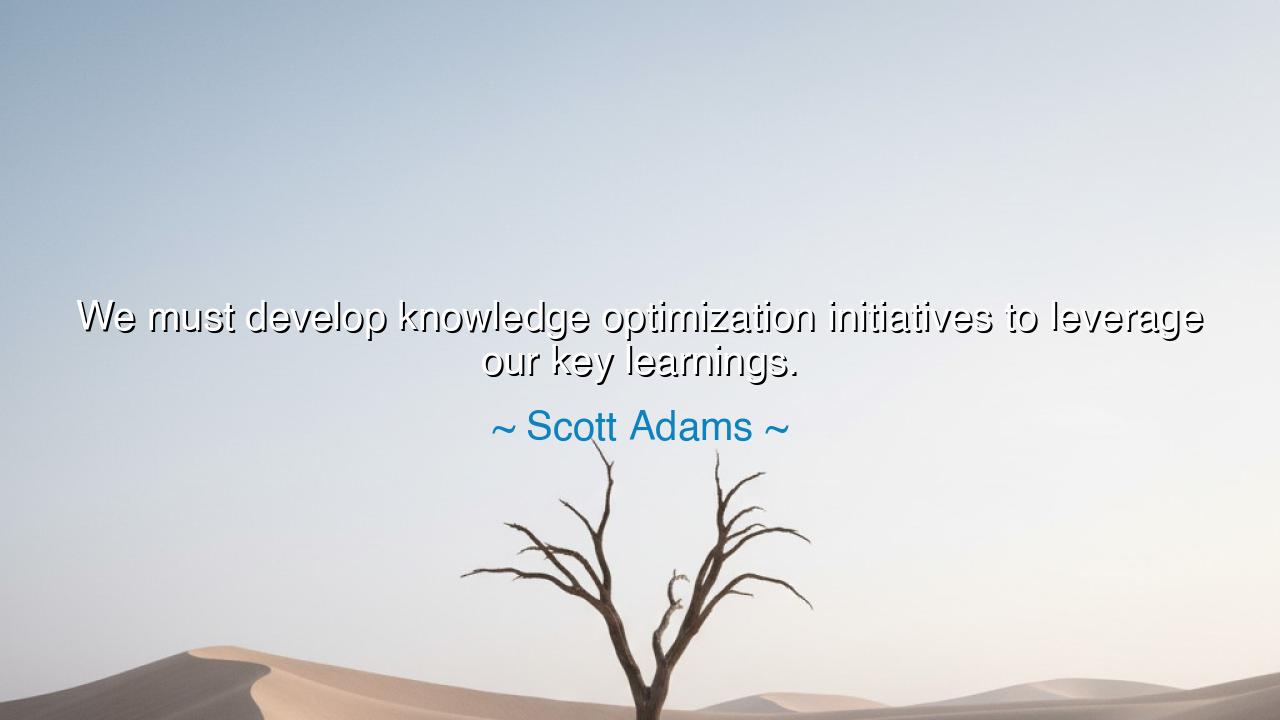
We must develop knowledge optimization initiatives to leverage






“We must develop knowledge optimization initiatives to leverage our key learnings.” Thus wrote Scott Adams, the satirist and creator of Dilbert, a man whose wit sliced through the fog of corporate jargon to reveal the absurdity hidden within. At first glance, his words seem to echo the sterile cadence of a boardroom — polished, official, and meaningless. Yet behind the humor lies a mirror held up to our age — an age where language has lost its soul, where men cloak confusion with grand phrases, and where the pursuit of knowledge has become a performance rather than a purpose.
Adams, through irony, exposes the emptiness of such words — the hollow echo of corporate speech that strives to sound profound while saying nothing. In mocking this form of expression, he forces us to confront a deeper truth: that in our quest to appear intelligent, we often abandon the very clarity that true intelligence demands. The ancients spoke plainly because they spoke from the heart. But modern man, burdened by his own vanity, too often replaces wisdom with buzzwords, as if complexity could make falsehood sound like truth.
Think of the philosopher Socrates, who walked the streets of Athens not in robes of ceremony but barefoot, questioning all who claimed to know. He stripped away pretense, forcing others to admit that they understood less than they professed. His power lay not in his eloquence, but in his simplicity — in his ability to make thought transparent. If Socrates were alive today, he would hear phrases like “knowledge optimization initiatives” and smile sadly, for he would know that we have forgotten the most sacred law of wisdom: that the purpose of language is illumination, not disguise.
To “leverage key learnings,” as Adams writes, is to mock the way our society mistakes motion for progress. How many meetings are filled with such phrases, meant to sound visionary but empty of action? How many minds confuse clever wording with genuine thought? Adams’ jest cuts like a blade because it exposes the decay beneath modern speech — a world where clarity has been sacrificed to appearance, and where true learning is buried beneath layers of pompous vagueness. He teaches us, by ridicule, that wisdom does not dwell in the tower of abstraction, but in the plain fields of understanding.
Yet beneath the satire, there is a deeper calling — a reminder that knowledge, if it is to be of any worth, must be alive. It must be practiced, not proclaimed. It must lead to creation, not conversation alone. To truly “optimize knowledge” is not to dress it in grand words, but to make it useful, human, and humble. The artisans of old understood this truth. When the builders of the Gothic cathedrals set their stones, they did not speak of “strategic architecture alignment”; they spoke of craft and devotion. Their work stood not because of their slogans, but because of their faith in clarity and purpose.
So too in our time, we must strive to recover that spirit. When we speak, let our words be clear enough for a child to understand, and when we work, let our knowledge serve not our vanity, but our community. Strip away the armor of jargon, and let meaning stand naked in the light. For the truest optimization of knowledge is not in how we phrase it, but in how we live it — how we turn learning into wisdom, and wisdom into good.
Therefore, O seeker of truth, take heed of Adams’ jest, for within it lies the laughter of the wise. Beware of words that glitter but do not guide. Speak plainly, think deeply, act sincerely. Let your knowledge be a lamp, not a mirror. For the world has enough speakers who sound wise — it needs those who are wise. And if ever you find yourself tempted to “develop knowledge optimization initiatives,” pause, breathe, and say instead: “Let me learn well, and use what I know to help others.” In that simplicity lies the highest mastery — the one that even satire cannot mock.






AAdministratorAdministrator
Welcome, honored guests. Please leave a comment, we will respond soon